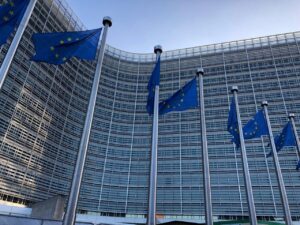The area of the former Soviet Union is particularly important for Russia, especially in the context of Ukraine, which is one of the main routes of Russian gas supplies to Europe. Moscow wants to take this role away from Poland’s eastern neighbors, trying to push through the controversial project of the Nord Stream 2 gas pipeline. To this end, it continues to destabilize the situation on the Dnieper, which is to undermine confidence in Kiev and deprive Ukraine of the role of a transit state. Ukraine is afraid that this may lead to a further escalation of the conflict in the east of the country – writes Piotr Stępiński, editor at BiznesAlert.pl. (ending of part one)
It is worth noting that Gazprom’s proposal was referred to by the Ukrainian Minister of Energy and Coal Industry, Igor Nasalek, who said that the transit of 10-15 billion cubic meters is unprofitable for Kiev. – In this case, we would have to pay extra to carry out the transit of such a volume – he said. In his opinion, it is profitable when it amounts to at least 40 billion cubic meters annually. – With a transit volume of 40 billion cubic meters, economic indicators are the same as in the case of Nord Stream. However, over 40 billion cubic meters transit through Ukrainian gas pipelines is more profitable than the one implemented by Nord Stream. If Europeans are motivated by economic considerations, then there is nothing to talk about. Ukrainian gas pipelines are more profitable – he said.
Reforms are necessary
In this context, he reminded about the reform of the gas sector in Ukraine and increased interest of foreign entities in cooperation with Ukrtransgaz and Naftogaz. The branches on the Dnieper were opened by Engie, Trafigura, Trailstone, MET, Axpo. The chances of gas cooperation with the Ukrainians are also noticed by PGNiG, which has repeatedly announced plans to increase gas supplies to the Dnieper, which will allow for the expansion of the gas connection between Poland and Ukraine in the future. Nevertheless, the acquisition of foreign partners is important for Kiev from the point of view of maintaining the role of the transit state for the supply of Russian fuel to Europe.
It should be noted that at the beginning of April last year, Naftogaz, Ukrtransgaz, Italian Snam and Slovak Eustream signed a memorandum on joint assessment of the possibilities of cooperation on the use and expansion of the Ukrainian system. The said document is aimed for ensuring the long-term stability of gas transmission through Ukraine, in accordance with European market standards, safe and effective use of Ukrainian gas pipelines, as well as transparent and free access to them by third sides, in accordance with Ukrainian law. Acquiring new partners and the possibility of developing cooperation with existing ones will probably depend on the pace of energy sector reforms implemented on the Dnieper. These, in turn, do not run at the pace that Western partners would expect.
Ukraine needs support of the West
Ukraine needs interest and support from the West not only to carry out the necessary reform process, but also successfully complete the path of Euro-Atlantic integration. If interest in Ukraine will decrease, Russia will want to fill this space. It can not be ruled out that Ukraine’s fears are unfounded. The more so because the Kremlin’s policy can be unpredictable, and the words of local politicians quite often lose their relevance. In this context, it is also worth recalling that when on 4 March 2014 Vladimir Putin was asked whether Russia was considering the annexation of Crimea, he answered the firm „no”. Exactly three weeks later, he signed the act of annexation of the peninsula.
The Russians are virtuosos of playing frozen conflicts, including in Nagorno-Karabakh. While Moscow perceives Transnistria and Abkhazia as a success, in the case of the annexation of Crimea and military operations in the Donbass, Russia has failed to achieve its goals. It seems that at the time when Vladimir Putin made the decision to occupy and annex Crimea, he thought that after a few months Ukraine would disappear from the international space and be a different unit in the understanding of international law. However, it did not happen.
Thanks to the management of frozen conflicts in the Donbas, Moscow can influence the balance of power in the region. At the time when it considers it appropriate or when its interests are threatened, it will be able to resume them on a full scale, although officially, contrary to the facts, Russia argues that it is not a party to the conflict in eastern Ukraine.
The weakness of Ukraine gives Russia strength
Moscow, each time and at various levels, will articulate its great-power ambitions. Both in military terms and in terms of energy. Moscow’s strength is the weakness and lack of unity of the sides with whom it sits at the table of talks and that is why it is so important that in such important areas as Ukraine or energy security the European Union speaks with one strong voice. This seems to be the only rational response to the threat from Russia. Just as the EU member states (though not all) have reacted with the expulsion of Russian diplomats in response to poisoning Sergey Skripal in the United Kingdom, they should also show solidarity with Ukraine. Not only in the verbal sphere, but in specific activities.
There is no strong Russia without a weak Ukraine. By strengthening Kiev’s position towards Moscow, Europe may weaken the strength of the Russian bear. Without Europe’s support, the conflict over the Dnieper may once again get stronger, and it may be evolved to evolve into more comprehensive military actions.








